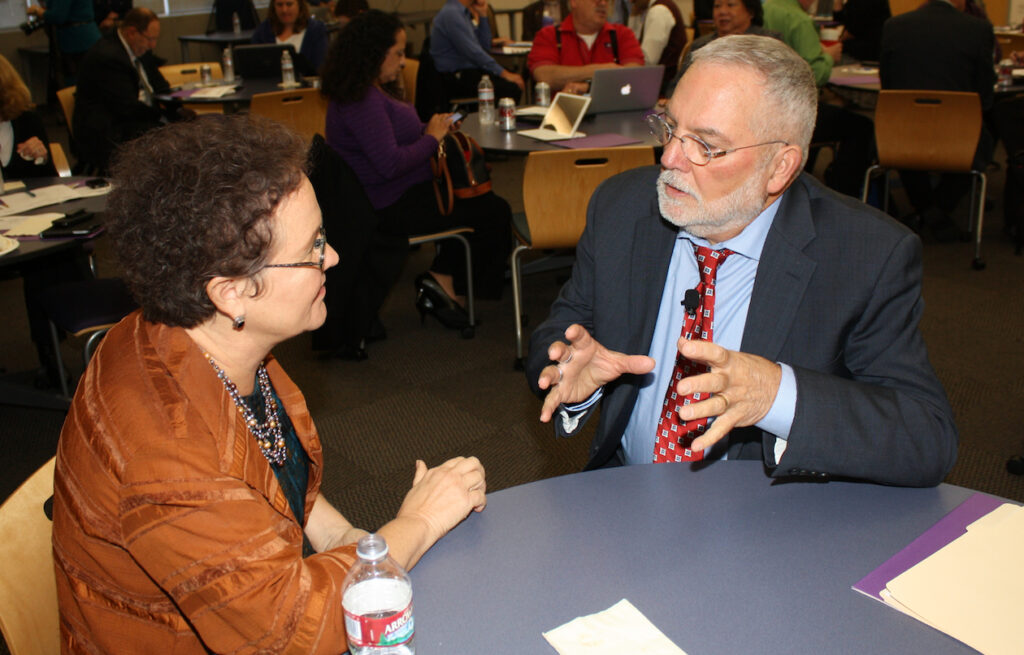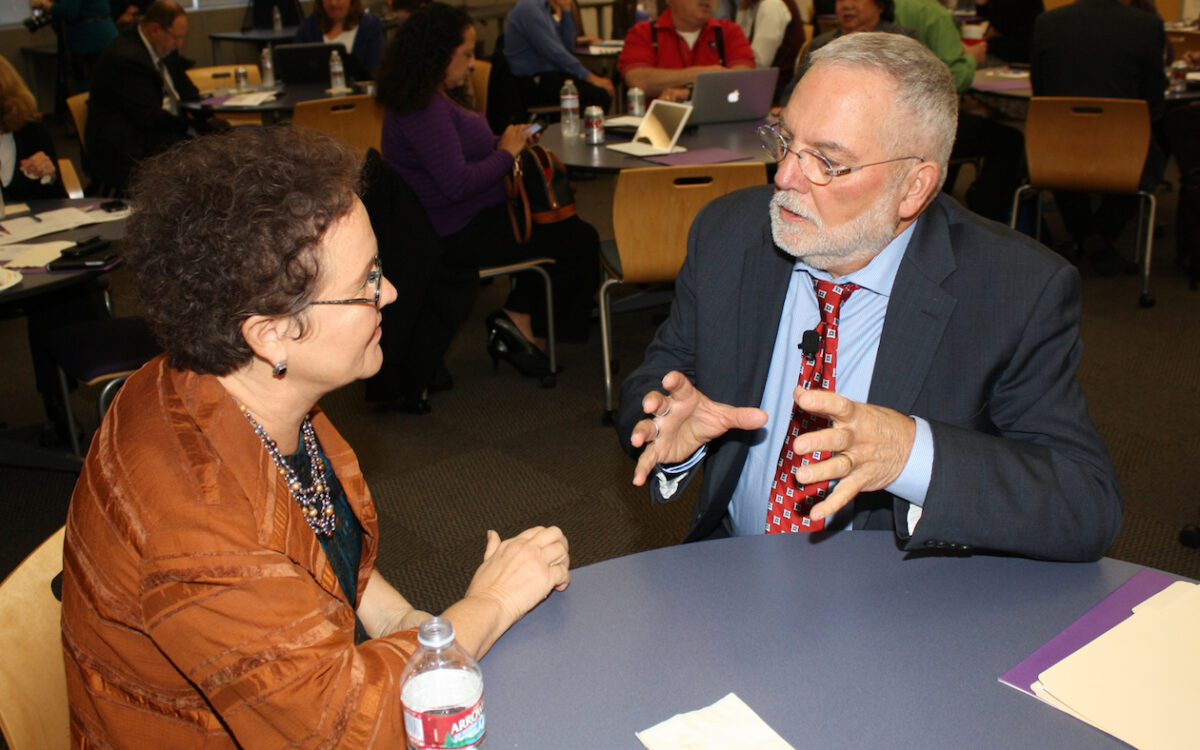 Credit: Mike Myslinski, CTA
Credit: Mike Myslinski, CTAWith $6.6 million in support from foundations, the California Teachers Association is teaming up with two Stanford University-affiliated organizations to provide training in the Common Core and the state’s new science standards that aims to reach tens of thousands of California teachers in three years.
A newly established Instructional Leadership Corps, with 160 teacher leaders and two dozen administrators in its first contingent, will lead the effort in the current school year. Teams of two instructors will lead multiple workshops for at least 100 teachers on strategies for teaching the new standards.
CTA President Dean Vogel said the union’s involvement signals that most of its 325,000 members remain enthusiastic about the new standards at a time when many teachers outside California are voicing doubts or turning against Common Core. Opposition is particularly building in states where teachers will be evaluated by students’ performance on Common Core tests, he said.
For Common Core to be introduced effectively, Vogel said, teachers should be involved in planning and leading the training, he said, because teachers trust the advice and practices shared by their colleagues. Rather than presented at one-time conferences, training should be collegial, with teachers working together around specific curricular needs over a long period of time, added Linda Darling-Hammond, a Stanford Graduate School of Education professor who has helped to organize the project.
Darling-Hammond said that teacher and principal training in the new standards has been “uneven” throughout the state. Some leadership corps members are from districts with extensive professional development. But in many of the state’s 1,000 school districts, many of them small, she said, “people are grabbing whatever they can with no guided process to decide what is quality and what is not.”
California is among 43 states that have adopted the Common Core State Standards in English language arts and math. Last year, it became an early state adopter of the Next Generation Science Standards, which, like Common Core, stress analytical thinking and a conceptual understanding of science. While the Smarter Balanced Assessment Consortium tests on Common Core will be introduced next spring, tests on the new science standards are likely four years away.
“Common Core has created an opportunity to break from mistakes of the past decade and to let teachers determine decisions affecting the classroom,” said Fresno Unified teacher Adam Ebrahim.
Each teacher trainer this year will receive a $2,000 stipend. At the end of three years, several thousand teachers are expected to have received leadership training at their schools, expanding the project’s reach to 50,000 teachers and administrators, according to CTA. Districts will be asked to fund the workshops from their professional development budgets. The project will produce curriculum materials in the second and third years.
After three years, Darling-Hammond said, “we should end up with widespread, thoughtful expertise across the state.”
CTA is partnering with the Stanford Center for Opportunity Policy in Education or SCOPE, a research organization affiliated with the Stanford Graduate School of Education, and the National Board Resource Center at Stanford University. The center serves California teachers with National Board certification, a multi-year process that recognizes the efforts of accomplished teachers. National Board certification requires that teachers demonstrate their ability to teach higher-level skills, such as problem-solving and critical thinking, that are integral to Common Core, she said.
CTA has an instruction and professional development department and has offered regional programs and an annual summer institute in Los Angeles. But it has not led teacher training of the magnitude of the leadership corps.
“In my 15 years in California, I have not seen a teacher-led professional development initiative on any substantial scale,” Darling-Hammond said.
California districts have tended to rely on outside vendors for professional development, she said. After the adoption of the California state standards in English language arts and math in the late 1990s, publishers whose textbooks were chosen by the State Board of Education led the teacher training. That led many districts to adopt uniform, scripted criteria that many teachers disliked.
But, consistent with the move to local control under the state’s new funding formula, districts have latitude to implement Common Core and the Next Generation Science Standards and can adopt whatever curriculum materials they choose.
“Common Core has created an opportunity to break from mistakes of the past decade and to let teachers determine decisions affecting the classroom. Many teachers appreciate that,” said Adam Ebrahim, a ninth-grade human geography teacher in Fresno Unified who was selected as a teacher leader in the new CTA-Stanford program. “But there’s also the realization that if teachers don’t step forward, the window of opportunity will close. That makes this project so vital.”
Darling-Hammond said that the workshops will focus on instruction strategies needed to successfully teach the new standards. An English language arts session might guide teachers on the use of evidence to support writing or how to engage students as they closely read texts.
Ebrahim said he did a recent workshop at Fresno High on a specific need that teachers requested: strategies for encouraging students to generate thoughtful questions and for teachers to create questions that produce deeper levels of thinking. Teachers spent most of the workshop learning from each other through activities with little lecturing by him – a process that reflects what teachers should strive for with Common Core, he said.
The three-year program will be funded by the S.D. Bechtel, Jr. Foundation, Stuart Foundation and the California Education Policy Fund.*
*All three foundations also provide funding to EdSource but have no say in EdSource’s editorial decisions.
To get more reports like this one, click here to sign up for EdSource’s no-cost daily email on latest developments in education.












Comments (3)
Comments Policy
We welcome your comments. All comments are moderated for civility, relevance and other considerations. Click here for EdSource's Comments Policy.
Gary Ravani 9 years ago9 years ago
Polling of teachers about CCSS may well fall into the mire of public polling and opinion about Obamacare (ACA). Currently it is asserted that about 35% of the public supports ACA while 47% do not support it. What isn't stated is that a good portion of the 47% don't support it because it didn't go far enough in the direction of single-payer or Medicare for all. It's not that they don't want government in involvement … Read More
Polling of teachers about CCSS may well fall into the mire of public polling and opinion about Obamacare (ACA). Currently it is asserted that about 35% of the public supports ACA while 47% do not support it. What isn’t stated is that a good portion of the 47% don’t support it because it didn’t go far enough in the direction of single-payer or Medicare for all. It’s not that they don’t want government in involvement in healthcare, they want more government involvement in healthcare.
And so it goes with CCSS. It’s not that the standards themselves are objectionable, though some take that position largely because of the Gate’s involvement, it’s because of the poor implementation. There is also significant concern that the CCSS are linked at the hip with the possibility of more testing. It’s not that teacher don’t “want” CCSS, it’s just that they don’t want them implemented in all the wrong ways.
Certainly there is going to be some testing, and this site has done a lot to make those issues transparent.
In a way, New York did the nation a favor: It totally botched CCSS and the new state testing program. In NY CCSS were implemented with no materials, little professional development, and little time to teach students the new standards. When the testing was prematurely done the students looked bad and so did the teachers. Then something “strange” happened. Parents understood that, in spite of Arne Duncan telling them they were “spoiled” suburban Moms, their kids hadn’t regressed in a year, but rather that neither kids nor teachers under the state imposed system had a chance to do their best. The state officials were held politically accountable. Now, kids looking bad: No problem. Teachers looking bad: A positive with more ammunition to bash them and their unions. But, politicians looking bad: Yowee! No can do. So NY has backed off, even Arne and Gates have backed off, and a lesson has been learned. When a lesson is learned in education by politicians and self-styled “reformers” that is cause for amazement.
That means, in CA, we can try and do it all correctly. Wait for materials to be developed and disseminated, put professional development like that described in this article in place, try and put testing into its proper and limited place in the pedagogic firmament, put necessary technological supports in place and maybe, just maybe, look at what needs to be done to reduce class size and fund schools adequately.
Jamie Epps, MLS 9 years ago9 years ago
The reach of these grants could be multiplied many times over by training teacher librarians, who are typically skilled (or at least enthusastic about) augmenting and supporting curriculum, including 21st learning skills such as advanced search skills, which are indispensable to complete implementation of CCSS.
Don 9 years ago9 years ago
John, I suspect that the CTA along with its CCSS partners in government and business are trying to stanch the bleeding of teacher support which is profuse. The recent and respectable Ed Next poll has some pretty harrowing numbers. I found the last sentence below of particular interest. (As you know, this source is generally considered pro-reform so the poll numbers should not be underestimated.) WINTER 2015 / VOL. 15, NO. 1 Declining teacher support. Teachers, … Read More
John, I suspect that the CTA along with its CCSS partners in government and business are trying to stanch the bleeding of teacher support which is profuse. The recent and respectable Ed Next poll has some pretty harrowing numbers. I found the last sentence below of particular interest. (As you know, this source is generally considered pro-reform so the poll numbers should not be underestimated.)
WINTER 2015 / VOL. 15, NO. 1
Declining teacher support.
Teachers, too, have soured on the Common Core (see Figure 1). Just a year ago, 76% of teachers backed the Common Core, but the portion in favor has now plummeted to 46%. Meanwhile, teacher opposition has more than tripled, from 12% to 40%. (The percentage without a position on the issue remains essentially unchanged.) Once again, signs of polarization are evident, with positive views expressed by Republican teachers falling by 34 points, from 69% in 2013 to 35% in 2014, while among Democratic teachers the percentage has slipped only 15 points, from 69% to 54%.
Especially intriguing is the flip in the opinion gap between teachers and the public as a whole. In 2013, teachers were more positive in their views of the Common Core than the public (76% compared to 65%), but today teachers are less positive (46% compared to 53%). A year ago, only 12% of the teaching force expressed opposition—virtually the same as the public. Today, teacher opposition is nearly twice as high as opposition among the public (40% compared to just 26%).